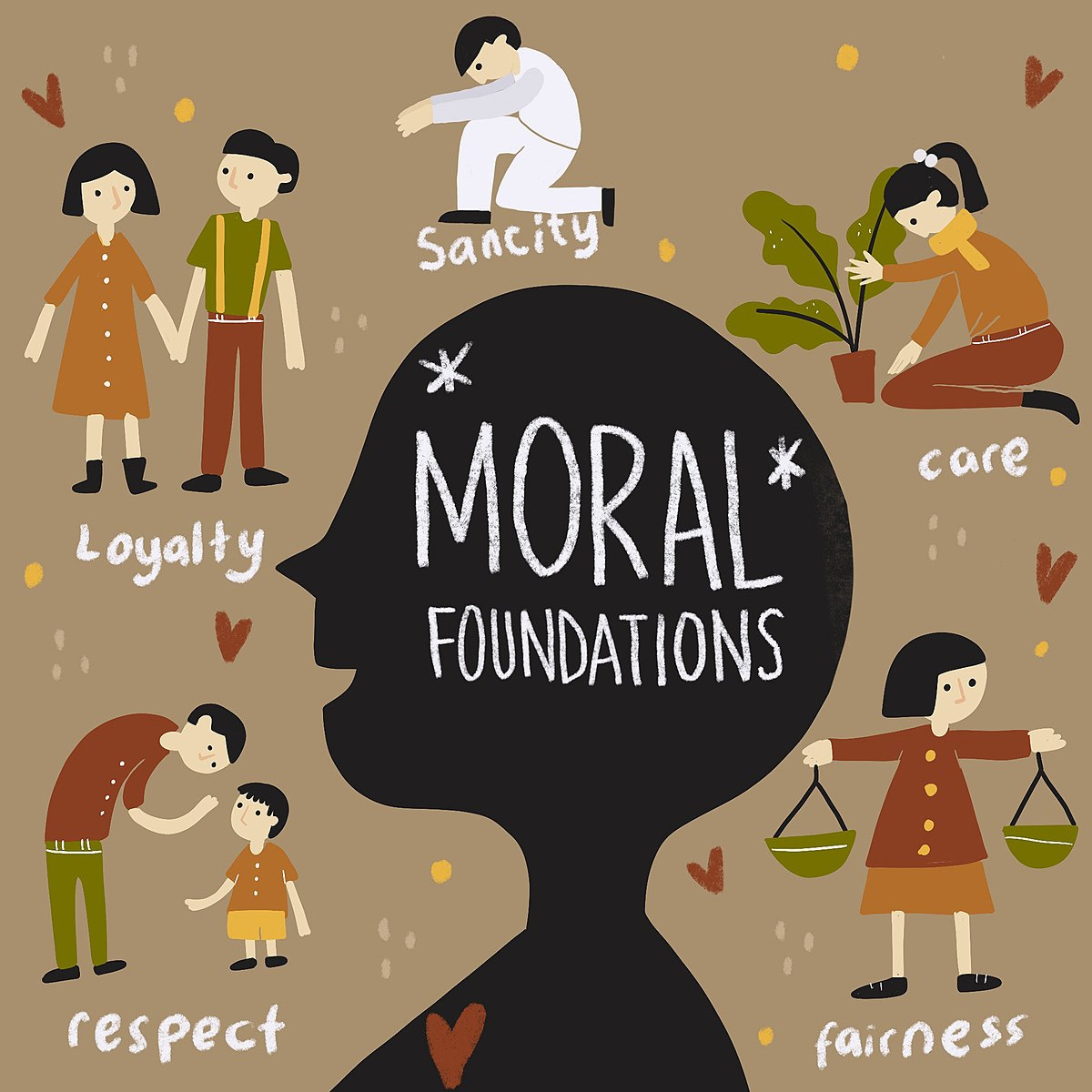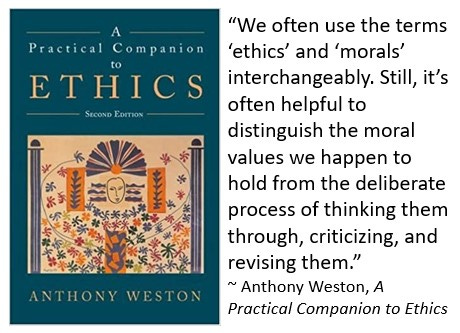This post is part of an ongoing series exploring ethics, the first of which was, “Being Good: Refusing to Leave Moral Goodness to Chance.”
My first encounter with ethics was in community college. I was pursuing a two-year degree in film, and my advisor informed me that I had to take a humanities course. The advisor set me up with “Introduction to Ethics.” I had no idea what I was in for. By the time the semester was over, I had begun to fall in love with the humanities—philosophy in particular. At the time, I would go on to be a college professor teaching the very same class.
As often as the word “ethics” is tossed around you'd think we have a generally clear sense of the word's meaning. But that's not really the case. People routinely use “ethics” as a synonym for “morals.” Though they are related, there are important differences between each of these ideas. Understanding the difference helps us appreciate the vital importance of ethics for us personally, socially, and politically.
Distinguishing Ethics and Morality
Our “morals” are the value-based beliefs we hold. When we say that something is “moral” or “immoral” we are asserting that something is right or wrong, good or bad. Beliefs about what human beings deserve from one another, how we should treat each other, what we should be allowed and disallowed from doing to one another or even ourselves are matters or moral belief.
The problem we humans inevitably encounter is that our moral beliefs are sometimes in conflict with others’ moral beliefs. Strangely enough, sometimes our own moral beliefs are in conflict with one another! Add to this the fact that a lot of what we believe is right and wrong is the result of upbringing and acculturation rather than genuine independent reflection and analysis. This is where “ethics” comes in.
Ethics is another word for “moral philosophy.” In other words, ethics is the philosophical examination of morality. To get clear on what ethics is, then, we need to be clear on what philosophy is about.
Philosophy takes up questions that may be beyond the scope of purely empirical, scientific study. Philosophy involves critically examining the meaning, logical consistency, and application of beliefs and concepts that are of ultimate concern to humanity. Philosophy helps us explore the relationship between our beliefs about ourselves and the world with the aim of enhancing our intellectual integrity. The goal, in other words, is a set of rational, cogent beliefs. Such philosophical practice gives us a better shot of living a principled and purposeful existence.
When we do philosophy, we explore the meaning and implementation of ideas such as truth, beauty, love, freedom, values, existence, and morality. We dig beneath surface-level assumptions and dictionary definitions to locate and then interrogate the tensions between and contradictions in our beliefs and commitments. We deploy thought experiments that relay upon intuition, creativity, and rational thought to test the parameters and implications of our most basic and foundational beliefs.
The German existentialist philosopher, Friedrich Nietzsche, believed that much of what passed as “morality” was really parroted opinion. Nietzsche argued that feelings pertaining to “good” and “evil” often resulted from social indoctrination and cultural conformity.
Applied to ethics, this means that moral philosophy is the critical examination of our moral beliefs, theories, and practices. Philosopher Anthony Weston helpfully explains the distinction between ethics and morality this way:
“We often use the terms ‘ethics’ and ‘morals’ interchangeably. Still it’s often helpful to distinguish the moral values we happen to hold from the deliberate process of thinking them through, criticizing, and revising them.”
Ethics is not mere adherence to inherited or culturally dominant beliefs about what is right and wrong. The German existentialist philosopher, Friedrich Nietzsche, believed that much of what passed as “morality” was really parroted opinion. Nietzsche argued that feelings pertaining to “good” and “evil” often resulted from social indoctrination and cultural conformity. Such ideas are sometimes so deeply internalized that it is difficult to seriously consider a different moral perspective. In The Gay Science (1887), Nietzsche wrote:
“But that you take this or that judgment for the voice of conscience—in other words, that you feel something to be right—may be due to the fact that you have never thought much about yourself and simply have accepted blindly that what you have been told ever since your childhood was right.”
In other words, our confidence in one or another moral belief may be due more to unthinking conformity than an authentic conviction or moral truth. The strength of our feeling that something is so obviously right or wrong may be due more to familiarity or even ignorance than truth or rational support. The fact something is familiar or strongly felt often distracts us from a fair-minded, reasonable examination of the question at hand.
We can’t escape this disquieting interrogation of what feels right or wrong by invoking subjectivism, the idea moral views are just a matter of taste or personal opinion. Moral subjectivism leaves us with intolerable implications, namely that our objection to sexual assault, abusing children, and exploiting human beings are mere matters of individual opinion. But they're not, and those of us honest enough to think these subjects through know it. It is axiomatically true that it is wrong to unnecessarily harm a being who wishes not to be harmed. There is something elementally reprehensible about violating a thinking and feeling being's bodily autonomy to, for example, gratify the desire to hurt them. (Confronting the way our attempt to resolve moral disagreement through subjectivism is contradicted by our belief in the objective immorality of arbitrarily torturing children, for example, is an example of doing philosophy—moral philosophy in particular.)
Pioneering philosopher and social psychologist, Erich Fromm argued that objective morality originates in what he called “Humanistic conscience,” an
“intuitive knowledge of what is human and inhuman, what is conducive of life and what is destructive of life. This conscience serves our functioning as human beings. It is the voice which calls us back to ourselves, to our humanity.”
The source of ethical knowledge, according to Fromm, is rationally governed human intuition illuminated by empirical observation and knowledge. The precise implications of such a theory of moral goodness is of course up for debate and discussion. What do we do when our desire to protect life appears to require the destruction of life? Are we entitled to create a hierarchy of lives more or less valuable based on species, for example? What qualities or characteristics must a being possess in order to enter the circle of moral concern? How are we to weigh our own interests or the interests of those nearest and dearest to us compared to the interests of others? Doing ethics entails thinking through not only individual moral problems but also the very moral principles that guide such decision making.
Ethics forces us back to the table of dialogue and self-examination. We are given the strange challenge of getting to know ideas that are on the one hand so familiar to us, and on the other hand, unclear and inconsistent. Ethics tasks us with going beyond the surface of reactive feeling and familiarity, toward the depths of self-knowledge and intellectual, moral integrity. Ethics challenges us to contemplate the basis and implications of our moral beliefs. And to the extent that we cannot find a basis that isn’t contradicted by some other deeply felt moral belief, ethics challenges us to consider the possibility we are wrong about one of the beliefs under scrutiny.
Thinking Ethically, Confronting Moral Inconsistencies
Drawing on my experience, from unsuspecting ethics student to college professor, it’s clear to me that there are a lot of questions and inconsistencies in our moral beliefs and lives that we tend to avoid. This creates the rather strange experience of finding it difficult to explain let alone justify our own deeply felt and identified-with moral beliefs. And when we do work out the basis of those beliefs, we often find ourselves claiming to believe things we do not readily identify with or things that contradict some of our other cherished beliefs.
Here is a sampling of ethical questions that helps us recognize both the importance of ethics and how it differs from mere moral opinion. To do ethics is to think critically about our morality.
If we have a duty to help a child drowning in a shallow pond, sacrificing the fancy clothes we are wearing at the time, aren’t we equally morally required to forgo the purchase of fancy clothes to help children dying of preventable disease in other parts of the world?
If it’s wrong to mistreat a dog because the dog is a sensitive, conscious being, isn’t it equally wrong to mistreat—and eat—pigs who are equally sensitive and conscious beings, when nutritious non-animal food alternatives are available?
Does something being “natural” make it morally acceptable? If it was determined that pedophilia, for example, was partly “natural” in some individuals, would we regard the behavior by those individuals as morally acceptable? Given that our answer is going to be, “no,” we are then tasked with asking, what is the relationship between naturalness and morality? And how does this square with some of our other beliefs?
If morality is subjective, whatever we happen to believe is good or bad is indeed good or bad. But this implies that all of our moral beliefs are always right. Such a view contradicts our basic awareness that human beings are not perfect and do in fact make mistakes, including those moral mistakes. Ethics insists that we address this contradiction.
Some say that morality is culturally relative. But cultures are shaped by people, with some having greater or less influence on the dominant beliefs and practices of the culture. In every culture there are people who disagree with the dominant cultural beliefs. Thus, we are forced to ask, is cultural relativism another way of saying that morality is determined by the popularity of or power behind an opinion? If so, why should we find comfort or confidence in basing moral claims on such fallible sources? Perhaps even more important, if cultural relativism is true then all social reformers are wrong. Yet, many of the cultures we are today called to accept, by advocates of cultural relativism, are the result of social transformations led by reformers dissenting from their own dominant culture.
If morality is culturally relative, and a society approves of marriage between 12-year-old girls and 40-year-old men, then that practice must be morally correct. Those of us who insist this practice is not morally acceptable are logically committed to rejecting cultural relativism and embracing some form of moral universalism. But how does this denial of relativism square with our other beliefs? And if morality is not necessarily relative, the question then becomes, what is the basis of objective or universal moral judgments?
Some argue that the government should have no role in regulating people’s private lives. Yet even those who find this principle favorable when it pertains to matters of reproductive rights, same-sex relations, and other personal decisions must recognize that the government’s decision to criminalize spousal abuse, marital rape, and child abuse are all examples of the state regulating people’s conduct in private life. Such moral and legal involvement in interpersonal matters has been justified on grounds that one individual’s actions are affecting another person’s wellbeing and liberties.
The abortion topic, for example, may have less to do with whether or not the state is generally right to be involved in people’s private affairs and more to do with whether an embryo or fetus is as entitled to the same moral consideration as the pregnant woman. If an embryo or fetus has the same moral status as a child, then the state and concerned citizens are potentially justified in weighing in on this otherwise exclusively private decision, given our acceptance of the state’s incursion into the home to address conflicting interests. If on the other hand, an embryo or fetus lacks moral status, then the state and concerned citizens have no right to involve themselves in a pregnant woman’s decision making. (Obviously there is much more to be said on this complex topic including the morally significant fact that the actions under ethical examination occur entirely within a woman's body and thus have enormous implications for bodily autonomy. Future posts will address this topic in more detail.)
Don’t Shoot the Philosopher
Philosophers dating back to Socrates have gotten a bad-rap for stirring up trouble by instigating these kinds of discussions. They’ve been accused of artfully getting people to talk themselves into circles. (Socrates was put to death for his philosophical activities!) But philosophers like Socrates don’t aim to confuse but rather to untangle the inevitably complex and frustratingly contradictory web of human belief and action. It was the French Renaissance philosopher and essayist, Montaigne, who remarked that human inconsistency was, ironically, the most consistent feature of human character. “Nothing is harder for me than to believe in men’s consistency,” he wrote, “nothing easier than to believe in their inconsistency.”
A more honest assessment of the tension that accompanies philosophical thinking shows that the real source of frustration is not the inquiring philosopher, but the reality most of us are ill-prepared to answer basic questions about the relationship between many of our cherished and often conflicting beliefs. Much of the confusion philosophers are blamed for “creating” already existed, but was hidden behind a veil of silence and intellectual passivity. By asking people to clarify the meanings and implications of big-idea concepts like justice, love, political rights, moral wrongness, or fairness, we penetrate the surface of mere opinion and move toward knowledge, even if we do so rather clumsily, stumbling toward clarity.
When we think ethically, we don’t always work everything out in a perfectly cogent order. We may end up with a bigger mess on our hands than we would have believed we had at the start. That’s because we actually learn a lot in these disentangling Socratic dialogues. Namely, we learn that living lives of integrity and developing genuine knowledge are not easy achievements. My experience facilitating dialogue with students of varied ages, politics, religious and moral beliefs has also shown that this process promotes humanizing mutual understanding even when it cannot produce moral agreement. And such humanizing understanding is itself a vital moral outcome for maintaining a good society.
If you found this post interesting, please share it with others and like it by clicking the heart icon. And be sure to subscribe if you haven’t already.
Invite Dr. Nall to Speak
Dr. Nall delivers energetic live presentations and engaging workshops on the subjects featured in Humanities in Revolt. Those interested in booking a workshop or talk can get in touch through Facebook or by leaving a comment.
For more about my work go to JeffreyNall.com and find me on Twitter, Facebook, and Instagram.










Great stuff as always.
I’ve come to see myself by what I call “pro-choice consequentialism”. Meaning that you should be allowed to do something so long as you accept the consequences of it. If you know that a crime you’re going to commit is going to get you arrested, and you do it anyway, you deserve what happens to you. Or if you know that something is legal but might make you feel terrible later and you do it, then you should be allowed to do it.
Not necessarily in a libertarian perspective since I’m not a believer in limited government in the way they often do. The government has a role to play in creating these problems and in the solutions.